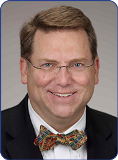
Douglas M. Sheeley
National Institutes of Health
Candidate Statement
ASMS has been an important scientific home since my first conference in 1988, providing opportunities to learn from leaders in the field, develop collaborative relationships, and understand how to contribute to the field. I have loved serving my colleagues through teaching, mentoring, and engagement, and I welcome this opportunity to continue to serve in a new capacity as Member at Large for Education, to support the leadership of the society as well as the career development of everyone in the community we all serve, both those starting out and those exploring new areas.
Douglas M. Sheeley, B.S. in Chemistry (Dickinson College), Sc.D. in Nutritional Biochemistry (Harvard University with Vernon Reinhold), Postdoctoral Fellow (National Institutes of Health, with Hank Fales), Postdoctoral Fellow (Burroughs Wellcome with Barbara Merrill). Dr. Sheeley is currently Deputy Director of the Office of Strategic Coordination (The Common Fund), in the NIH Office of the Director, Bethesda, Maryland.
Dr. Sheeley’s research interests include application of mass spectrometry to carbohydrate sequencing and glycoprotein characterization. He developed and applied MS-based methods in proteomics and glycomics at Glaxo Wellcome before returning to NIH as an extramural program official. For 17 of his 25 years at NIH he served as a program officer responsible for many research grants and programs in the development and application of novel technologies in biomedical mass spectrometry, proteomics, and glycomics, working with many of the leading laboratories in the field. Dr. Sheeley has been a scientific and organizational leader at NIH, serving as Branch Chief, institute Deputy Director, and Deputy Director for the NIH Common Fund.
Dr. Sheeley has been active in developing and leading ASMS educational activities for decades. For 25 years he has co-taught a two-day short course, Peptides and Proteins in Mass Spectrometry. After organizing several sessions and workshops on how to work with federal funding agencies, this was made an annual evening workshop ten years ago, organized with NIH and NSF colleagues. Dr. Sheeley annually organizes “Office Hours” for federal funding agency staff during the conference. He serves as an interviewer for the ASMS mock interview program, and makes a point of seeking out students and post-doctoral fellows at conferences to discuss their work and career development. He has also organized and chaired several conference sessions, and served as a reviewer for conference abstracts.